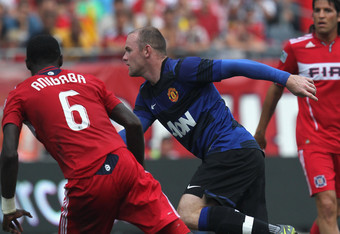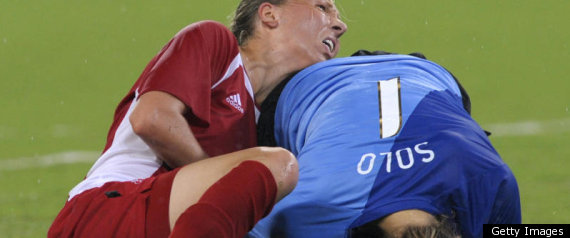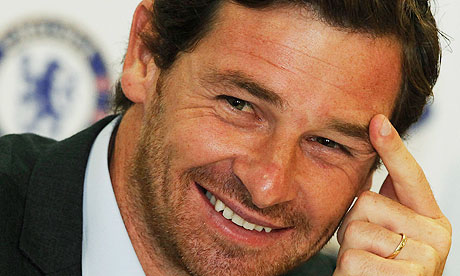
Nick LaBrocca's qualities have been clear to the most discriminating observers since he was a rookie fresh out of Rutgers seeing all of his playing time in Major League Soccer's Reserve League.
It quickly vaulted him into the Colorado Rapids' starting lineup, and then Toronto FC's after a trade last year, and
now we're getting to see him emerge into a star. The next step comes Saturday night against the Houston Dynamo at Home Depot Center.
LaBrocca has been a catalyst in Chivas USA's rebuild this season, taking charge on the attack to the count of a team-best six goals -- one more than he'd netted in his first four MLS campaigns -- a figure that merely hints at his importance to the Goats.
“I've been trying to get Nick for three years, at least. I'm just happy we have the opportunity to get him now,” said Chivas USA coach Robin Fraser, who came to the Goats from Real Salt Lake. “The good thing about him, too, is for all his ability, he's very humble and willing to do whatever the team needs him to do. You put that together with that kind of natural ability, he's a tremendous player to coach.”
LaBrocca, 26, who joined the Goats (5-7-8) in a preseason trade from Toronto, is an unassuming as they come. At 5-foot-8, 165 pounds, with a receding hairline and a genuine shyness, he's not going to be mistaken for a top-class athlete -- until he hits the field. Then he's the maestro, serving as Chivas' primary linkman and creator from his spot atop the club's midfield diamond.
“He's a great player. He gets better and better every game,” midfielder Blair Gavin said. “You're like, 'Can you get better?' And he does. He's shifty, he's crafty, he makes great runs off the ball ... he changes up the dynamic. [Opponents] got to be aware of this guy.”
Defender Zarek Valentin says LaBrocca “has four eyes when he's on the field.”
“He has two eyes behind his head and two eyes in front of his head. His awareness is incredible,” Valentin said. “And it's good to have those kind of guys where I can play the ball as hard as I can on the ground, and he'll take a perfect touch to where he wants it, and he'll start an attack out of that.”
Fraser praises LaBrocca's soccer IQ.
“That's one of the reasons we wanted to get him, because he's such an intelligent player,” the coach said. “And I think we've asked him to be even more active in finding open spaces on the field, and he's become very good at being able to find gaps and holes between defenders and slip into good spots. You put that with a very good first touch, and he makes himself dangerous frequently.”
His performance has been noticed. New York Red Bulls coach Hans Backe, who next week will guide the MLS All-Star team against Manchester United, included LaBrocca on his 22-man roster.
The game will be played at Red Bull Arena in Harrison, N.J., not too far north of LaBrocca's hometown, Howell, N.J. The opportunity to play in such a game in front of friends and family is humbling.
“This is like icing on the cake,” LaBrocca said after getting the news. “It feels good. I'm excited, honored. I feel very fortunate to be given this opportunity.”
He earned it with a series of superb performances capped by often sizzling goals -- and had scored in three successive matches before last weekend's 0-0 draw with the Red Bulls.
“I'm just kind of doing what I've been doing, what I've been working on,” he said. “It's just translated offensively a little more than it has before.”
Fraser has given him more responsibility than he had with Colorado or Toronto, and that's part of what has fueled LaBrocca, “helped me get on the same page as my teammates a little faster than I normally would.”
LaBrocca says that Fraser's staff, the chemistry among players and the atmosphere in the locker room have “made life very easy in transitioning in what would usually be a difficult and challenging time,” that he “mesh[es] well with this group of players, not only on the field, but off the field,” and that there's “still a lot to build on, and that's the exciting part.”
 Joshua Mayers is the Seattle Sounders FC writer for The Seattle Times, and wrote on his blog about Seattle Sounders FC Head Coach Sigi Schmid's thoughts on USSF's hiring of Jurgen Klinsmann (as provided by Sounders FC media relations). Klinsmann and Schmid have a longstanding relationship.
Joshua Mayers is the Seattle Sounders FC writer for The Seattle Times, and wrote on his blog about Seattle Sounders FC Head Coach Sigi Schmid's thoughts on USSF's hiring of Jurgen Klinsmann (as provided by Sounders FC media relations). Klinsmann and Schmid have a longstanding relationship.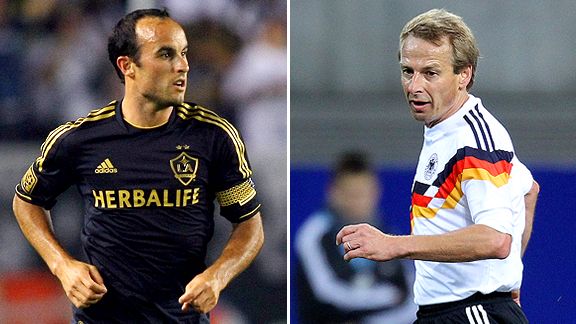
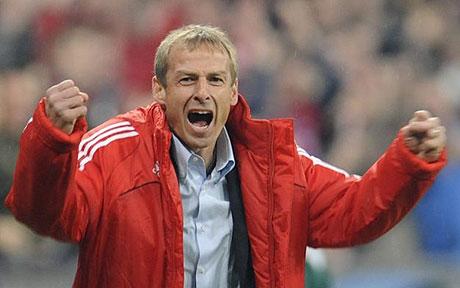




 Through this season's 177 games, the MLS's average crowd increased by 6.3 percent from its 2010 midseason mark, to 17,526.
Through this season's 177 games, the MLS's average crowd increased by 6.3 percent from its 2010 midseason mark, to 17,526. 

